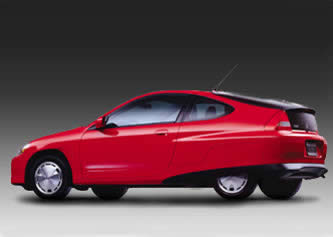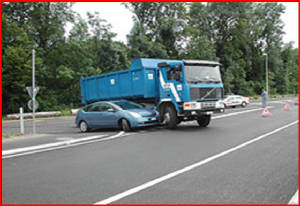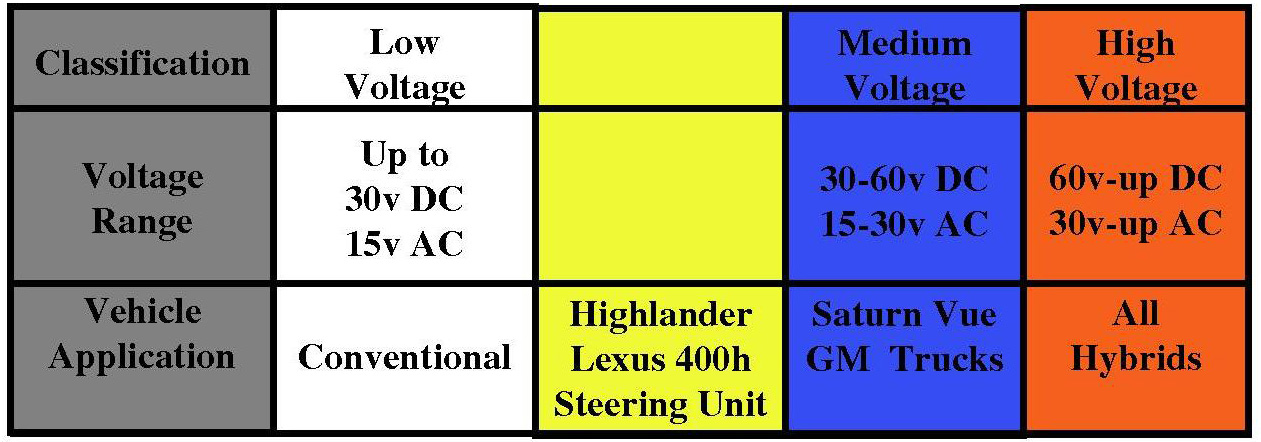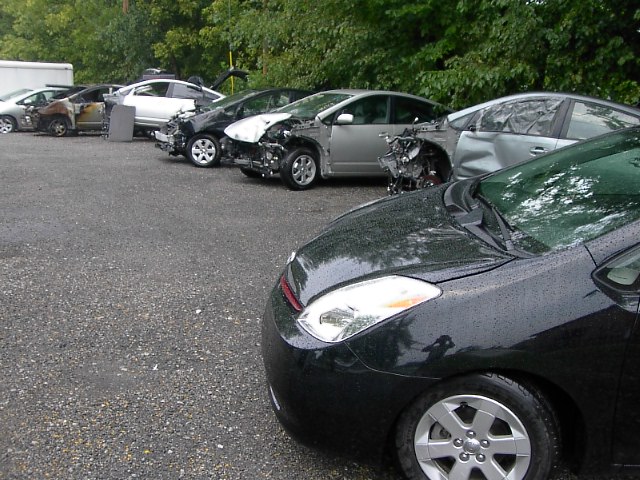|
Hybrid Vehicles
How Hydrid Vehicles Work - Advanced Hybrid Technology
Emergency Response to Hybrid
Vehicles
This website will take you through many:
With the latest information on hybrid and alternative fuel
vehicles.
General Hybrid Information
Hybrid
vehicles are in their infant stages of development. Most all auto makers are now working on new developments. As a result,
we are seeing many new types of operation, new modes of operation, new types of drive trains, and many different electrical
voltages.
There are also many types of Hybrid Vehicles.
-
Gas / Electric
-
Hydrogen
Fuel Cells
-
All
Electric (Plug ins)
-
Multi Fuel Vehicles

Gas/Electric
Hybrid Vehicles
In December
1999 Honda Insight was the first gas/electric vehicle brought into the U.S. Since then many more have been introduced, each bringing
in an all together different design.

 . .
How Gas/Electric Hybrid Vehicles Work
Hybrids can
have a parallel design, a series design, or a combination of both.
In a parallel design: The primary, or gas, engine is used for highway driving, an electric motor
provides added assistance during hill climbs, acceleration and other periods of high demand.
In a series design: The primary, or gas, engine is connected to a generator that produces electricity.
The electricity charges the batteries, which in turn, drive an electric motor that powers the wheels.
A series parallel: can also be built to use the series configuration at low speeds and the parallel configuration
for highway driving and acceleration.
Mild Hybrids: are a little different, GM uses a system in which the electric motor never propels the
vehicle, it only has the capability of shutting off the gas engine and restarting it at a stop, and acting as a 120 volt
AC generator.
 . .
Emergency Response to Gas/Electric Hybrid
Vehicles

Today there are a lot of rumors, misunderstandings and
misinformation out, about hybrid vehicles, that has created a great fear among emergency responders.
During our research, we asked a question
on many forum boards:
"Has anyone responded to a hybrid
vehicle accident?"
We received many replies from
departments that said:
“We do not and will not do extraction
on hybrid vehicles”
This is unacceptable for emergency
responders!
If we understand and practice a few safety measures. Hybrid Vehicles
are no more of a risk than Conventional Vehicles.
Hybrid vehicles, in fact,
have a lot of safety factors built into them, many of these you will not see in this study. The reason being, responders many
times rely on the built in safety factors that they have heard about. With all the pour information circulating and the fact
that no two hybrid vehicles are alike, this can be very confusing. Some where down the line, injuries are emanate.
If the guidelines in this general
study are practiced on every scene, you should be safe in handling most any hybrid emergency scenario.
The Margin of Safety Factor
Every mechanical part is subject to failure. Manufacturers have hundreds of recalls every year for failures that can cause injury
or death. This is why we do not depend on
built in safety.
If we perform our proven steps of safety, then the built in features
become an extra precaution to cover our human error.
Honda Insight was the first gas/electric vehicle brought into the US in December 1999, since then
many more have been introduced, each bringing an all together different design.
Some
standards were developed, such as the bright orange wires and connectors, indicating high voltage.
As
emergency responders, it is very important to our safety that we continually be aware of the major changes each year.
One of these changes that drastically effects rescuers
is that, from the introduction of hybrids vehicles, we have been taught to watch for any bright orange wires or components.
Warning! Today rescuers must be aware that
there are new color codes being used to identify electrical dangers.


Electrical shut down and stabilization
These operations are a must when
dealing with hybrid emergencies.
One of the biggest fears, is that
of being shocked or electrocuted.
Rescuers will not be shocked or electrocuted by touching
the metal body or frame.
Many instructors teach different sequences of performing
these operations, but it has been our experience that the safest way to perform these is in the numerical order listed below.
By using these eight steps --- in their order,
we can safely deal with most any hybrid emergency.
1. Chock the
wheels
2. Identify
the vehicle.
3. Shift it
out of gear or place it in park.
4. Turn off
and remove the key (smart keys at least 25 ft).
5. Be sure
the ready light or auto stop light is off.
6. Set the
park brake.
7. Disconnect
the 12 volt battery.
8. Never cut
or touch the orange, blue, or yellow wires or connectors.
Why must they be done in order?
All hybrid vehicles, except Honda Insight and Toyota Prius, look exactly like their conventional counter parts. The
only external identifying markings are very small emblems that must be observed by walking around the vehicle.
These emblems
can be easily overlooked especially at night, or the emblem can be missing as a result of the crash. Either way the rescuer
would not immediately be aware that he or she is dealing with a hybrid vehicle.
Every hybrid
has an idle stop mode, some times called the sleep mode. Though the engine is not running, if the ignition key is on and the
occupant has their foot on the brake, the vehicle is still fully operational. As you will see; if the occupant removes their
foot from the brake or touches the accelerator, the rescuer could be run over, simply trying to identify the vehicle.
Step number one: is to chock the wheels, with the wheels chocked the
rescuer can safely walk around the vehicle, to accomplish step two, which is to identify the vehicle.
In
dealing with so many different technologies and their constant change, it is impossible for the rescuer to know every vehicle.
We must find general procedures and habits that will work on any vehicle, no matter what it is or is not equipped with. In
this case, a very good habit would be to chock the wheels on every vehicle before any other procedures are performed.
In
facing reality; old habits are hard to break, traditionally rescuers and EMS have exited the truck and grabbed the medical bag the first thing. Consider placing two chocks in the same box with
the medical bags, not only making it handy, but immediately reminding the rescuer of the need for them.
Our
third step in securing the vehicle is to take it out of gear or put it in park; again emphasizing the need to chock the wheels
first. If the rescuer reaches across the occupant to shift the lever, it is highly likely that the occupant will have some
kind of a reaction, if that reaction included moving his foot off the brake or touching the accelerator, the rescuer could
be dragged or run over.
The fourth step; is to turn off and remove the ignition key.
As you will find in the advanced sections, this one simple step, not only turns off the engine, but it isolates the high
voltage to the HV battery, and on the Honda Hybrids it actually turns off the airbag system.
Why is it so important that
we take it out of gear before turning off the key?
Many of today’s
vehicles use either a joy stick type or floor shift type electronic shifter, instead of the conventional type, electricity
is required to operate them.
Step five is to; be sure the Ready or Auto Stop light
is off. Rescuers, without failure, must visually check this light. If this light is illuminated
or “ON” even though the engine is not running the vehicle is fully operational.
Step six; Set the park brake. Many times, in an extrication
type scenario, the park brake will not be immediately accessible, but if or when it is accessible, set the brake as an extra
precaution against vehicle movement.
Step seven; disconnect the 12 volt battery. Rescuers must perform this step,
not only for the occupant’s safety, but their own as well. You will find in the technical information that by turning
off the key we isolate the high voltage to the HV battery, but some vehicles are equipped with multiple 450 to 850 volt capacitors
in the inverter, (under the hood). Disconnecting the 12 volt battery isolates this power from entering the HV cables.
A second reason for disconnecting the 12 volt battery is that it shuts down
the SRS or Airbag system. As mentioned before the Honda Hybrid‘s airbag
system is shut down by simply turning off the ignition switch, but keep in mind that these are the only vehicles that have
this feature.
Step eight; never cut or touch any bright Orange,
Blue or Yellow wire or component connected to it. Every hybrid and high voltage system is totally insulated and isolated from
the metal body and frame of the vehicle. Multiple ground faults and voltage monitoring sensors are built into the systems
along with high voltage fuses.
Never depend on these systems. Remember our margin of safety factor. Manufacturers
have routed the high voltage cables in areas that a rescuer should never have to access, in order to accomplish a successful
extrication.
Warning! Remember we have not removed the high voltage from the vehicle, we have only isolated it to the HV battery.
Never open, cut, or handle the NiMH battery.
Once we have performed these eight steps the vehicle is the same as
any conventional vehicle.

Hybrid Fires

Follow normal firefighting procedures.
Protect all exposures and flood the HV battery
pack, located in the trunk, with copious
amounts of water. It will effectively control the
HV battery pack fire, by cooling the adjacent
Ni-H battery modules below their ignition point. The remaining modules on fire, will burn themselves out.
Firefighters
will not be electrocuted

Advanced Gas/Electric Hybrid Technology

Click on the links below to enter
our self study courses.
These are in depth studies of each
make and model of hybrid vehicle.
These classes are in slide show form and may take
2 - 5 minutes to download, as they are very large files.
These classes are under constant revision
as information becomes available, so be sure to check them often.
(New version coming soon)
Emergency Response To Alternative Fuel Vehicles
(New version coming soon)
|

